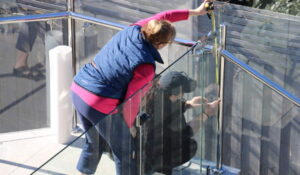Window Film for Privacy and Security: A Comprehensive Guide
If you’re looking for a way to enhance your privacy and security at home or in your business, then window film might be just what you need. Window film is a thin sheet of material that can be applied to the surface of your windows to provide a range of benefits, including privacy, security, and energy efficiency.
Privacy is an important consideration for many people, especially those who live or work in busy areas. Window film can help to block out prying eyes, providing you with the peace of mind that comes from knowing that your activities are not being watched by others.
Security is another major benefit of window film. Many types of window film are designed to be shatter-resistant, meaning that they can help to prevent glass from breaking if someone tries to break into your home or business. This can provide an added layer of protection against burglars and intruders.
The purpose of this article is to provide you with a comprehensive guide to window film for privacy and security. We’ll cover everything you need to know, from the different types of window film available, to the factors you should consider when choosing the right film for your needs, to the installation and maintenance of your window film. By the end of this guide, you’ll have all the information you need to make an informed decision about window film for your privacy and security needs.
Types of Window Film
When it comes to choosing window film for privacy and security, there are several different types available. Here are some of the most common types of window film and their features, benefits, and drawbacks:
- Tinted Film: Tinted film is a popular choice for those who want to block out sunlight and reduce glare. It can also provide some degree of privacy, as it can make it more difficult for people to see inside your home or business. However, tinted film is not ideal if you want complete privacy, as it can still allow some light to pass through.
- Frosted Film: Frosted film is a great choice if you want to completely obscure the view through your windows. It can be applied to the entire surface of the window or in a pattern or design. Frosted film can also help to reduce glare and block out some UV rays. However, it can make your rooms feel darker, and it can be difficult to remove if you change your mind.
- Reflective Film: Reflective film is designed to reflect sunlight and heat away from your windows, making your home or business more energy efficient. It can also provide some level of privacy, as it can make it difficult for people to see inside. However, reflective film can be quite noticeable from the outside, which some people may find unattractive.
- Patterned Film: Patterned film is a great choice if you want to add some decorative flair to your windows while also providing some level of privacy. It can be applied in a variety of patterns and designs, allowing you to customize the look of your windows. However, like frosted film, patterned film can make your rooms feel darker.
- Security Film: Security film is designed to be shatter-resistant, meaning that it can help to prevent glass from breaking if someone tries to break into your home or business. It can also provide some level of privacy, as it can make it difficult for people to see inside. However, security film can be quite expensive, and it may not be as effective as other security measures, such as an alarm system or security cameras.
- Decorative Film: Decorative film is a type of window film that is used to add visual interest to windows. It can be applied in a variety of patterns, designs, and colors, allowing you to create a unique look for your home or business. However, decorative film does not provide any privacy or security benefits.
When choosing the right type of window film for your needs, it’s important to consider your priorities, such as privacy, security, energy efficiency, and aesthetics. By understanding the features, benefits, and drawbacks of each type of window film, you can make an informed decision that meets your specific needs.
Factors to Consider When Choosing Window Film
When choosing window film for your home or business, there are several factors that you should consider to ensure that you select the right product for your needs. Here are some of the most important factors to consider:
- Level of Privacy Needed: Think about the level of privacy you need. Do you want to completely obscure the view through your windows, or do you just want to reduce visibility? Consider the type of window film that best meets your privacy needs.
- Level of Security Needed: Consider the level of security you need. Do you want a shatter-resistant film to protect against intruders, or is that not a concern for you? If security is a priority, consider choosing a security film.
- Aesthetics: Consider the look of the film: Do you want a film that is decorative, or one that is more functional? Consider the type of window film that best matches your aesthetic preferences.
- Energy Efficiency: Consider the energy efficiency of the film. Do you want a film that will help to reduce your energy bills by blocking out UV rays and reducing heat gain? If so, consider choosing a reflective film.
- Ease of Installation: Consider the ease of installation. Do you want a film that you can install yourself, or do you want to hire a professional installer? Some types of film are easier to install than others.
- Cost: Consider the cost of the film. Do you have a budget to stick to, or are you willing to pay more for a higher-quality product? Consider the cost of the film, as well as any installation costs.
By considering these factors when choosing window film, you can select a product that meets your specific needs and provides the benefits you’re looking for.
Installation and Maintenance
After you have chosen the right window film for your needs, it’s time to install it. Here are some steps you can follow for a successful installation:
- Clean the Windows: Make sure that the windows are clean and free of any dust, dirt, or debris. This will help the film adhere properly to the glass.
- Measure and Cut the Film: Measure the size of the windows and cut the film to the appropriate size. Leave a little extra film on each side so that you can trim it later.
- Apply the Film: Spray the window with a solution of water and soap. This will help the film adhere to the glass without any air bubbles. Apply the film to the window and smooth it out with a squeegee or credit card. Trim the edges with a sharp knife or razor blade.
- Let the Film Dry: Allow the film to dry for a few hours before touching or cleaning it. This will help the film adhere properly to the glass.
When it comes to maintaining your window film, there are a few things you can do to keep it in good condition:
- Clean the Film: Regularly clean the film with a soft, non-abrasive cloth and a mild detergent. Avoid using harsh chemicals or abrasive materials that can scratch or damage the film.
- Repair Any Damage: If the film becomes damaged or starts to peel, repair it as soon as possible. This will prevent further damage and ensure that the film continues to provide the intended benefits.
By following these installation and maintenance tips, you can ensure that your window film is installed properly and remains in good condition for years to come.
DIY vs Professional Installation
When it comes to installing window film, you have two options: DIY or professional installation. Here are some factors to consider when deciding which option is best for you:
DIY Installation:
Pros:
- Lower cost: Installing the film yourself can save you money on installation fees.
- Flexibility: You can install the film on your own schedule and at your own pace.
- Satisfaction: You may feel a sense of accomplishment by completing the installation yourself.
Cons:
- Time-consuming: Installing window film can be a time-consuming process, especially if you have little experience.
- Skill level: Installing window film requires a certain level of skill and expertise, which you may not possess.
- Quality: DIY installation may result in a lower quality installation that doesn’t adhere properly, leading to air bubbles or peeling.
Professional Installation:
Pros:
- Expertise: Professional installers have the necessary skills and experience to install the film properly.
- Time-saving: Professional installation is typically faster than DIY installation, as installers have the necessary tools and equipment.
- Quality: Professional installation typically results in a higher quality installation that adheres properly and looks better.
Cons:
- Higher cost: Professional installation can be more expensive than DIY installation.
- Scheduling: You may need to schedule the installation at a time that is convenient for the installer.
By considering these factors, you can determine whether DIY or professional installation is the best option for you. If you have the necessary skills and time, and you’re looking to save money, DIY installation may be the way to go. However, if you want the best possible installation, or if you lack the necessary skills or time, professional installation may be a better choice.
Frequently Asked Questions
Here are some common questions readers may have about window film for privacy and security:
Q: How long does window film last?
A: The lifespan of window film depends on the type of film, the quality of the installation, and the amount of sun exposure the film receives. Most window films can last up to 10 years or more with proper installation and care.
Q: Can window film be removed?
A: Yes, window film can be removed. However, the process can be time-consuming and difficult, especially if the film has been on the window for a long time. To remove window film, use a heat gun or hair dryer to soften the adhesive, and then peel the film off the glass.
Q: Will window film affect my view?
A: Depending on the type of window film you choose, it may affect your view. Tinted film and reflective film can reduce the amount of natural light that enters a room and may make it harder to see outside. However, frosted film and patterned film can provide privacy while still allowing natural light to enter the room.
Q: Will window film provide security?
A: Yes, some types of window film, such as security film, can provide an extra layer of security for your home or business. Security film is designed to hold broken glass in place, making it more difficult for intruders to enter your property.
By answering these common questions, readers can better understand the benefits and considerations of using window film for privacy and security purposes.
Conclusion
In conclusion, window film is an excellent solution for enhancing privacy and security in your home or business. In this comprehensive guide, we have covered the different types of window film available, factors to consider when choosing window film, the installation and maintenance process, DIY vs professional installation, and frequently asked questions.
By weighing the pros and cons and considering the factors discussed in this guide, you can make an informed decision about whether window film is the right choice for you. If you decide to install window film, we encourage you to take action and enjoy the benefits of enhanced privacy and security in your property.
If you want to learn more about window film, check out our additional resources or links for more information. Thank you for reading, and we hope this guide has been helpful in your decision-making process.




